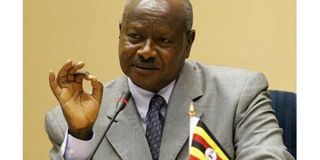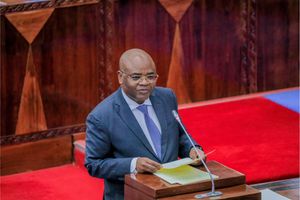Museveni leads EAC team in EPA talks with European Union

What you need to know:
- Mr Museveni is leading the region’s trade ministers in his capacity as chairman of the EAC Summit.
Dar es Salaam/Nairobi. Ugandan President Yoweri Museveni is leading trade ministers from East African Community (EAC) member states to the European Union headquarters in Brussels in an effort to reach a regional consensus on the Economic Partnership Agreement (Epa) deal.
Mr Museveni is leading the region’s trade ministers in his capacity as chairman of the EAC Summit. Kenya’s Trade Cabinet Secretary Adan Mohamed said in a telephone interview from the Belgian capital Brussels yesterday that his country hopes to bring Tanzania, Uganda, Burundi and Rwanda on board to take a united stand on the issue.
Kenya and Rwanda signed the deal in 2016, but it needs approval from all members of the East African Community bloc. “We have had meetings with the EU Wednesday and another one to be held today (Thursday). We are pushing for our case as a region but it is up to the EU to decide what will happen next in the event the remaining countries refuse to sign the deal,” he said.
The Epa has brought misunderstandings among EAC partner states, with Kenya accusing Tanzania and Uganda in March 2017 of being insincere in their refusal to join it.
In February, President John Magufuli described the Epa as a “form of colonialism”, saying the deal was bad for Tanzania.
Addressing a joint press conference with President Museveni at the State House in Dar es Salaam, Dr Magufuli disfavoured Epas, which are aimed at creating a free trade area between EU and the African, Caribbean and Pacific Group of States.
His Ugandan counterpart warned African countries that Epa might break up their unity. “It’s better if the signing of the deal is shelved until further consultations are made.”
Dr Magufuli noted that after studying Epa he had realised that African countries would not benefit from it economically as its architects touted.
He noted that terms included in the agreement were not intended to help African countries to grow economically.
“I believe that our neighbour, Uganda, will second us for the betterment of our countries. We have discussed Epa for a long time but to me it seems like another form of colonialism… it is bad for our country,” he said. There has been criticism in other quarters that the non-reciprocal and discriminating preferential trade agreements offered by EU are incompatible with World Trade Organisation rules.
President Museveni noted that the fact that many African countries had not signed EPA shows that the proposal was meant to create disunity among African countries.
Assuming the EAC Summit chairmanship from Dr Magufuli in May, 2017, Mr Museveni promised to harmonize the region’s vision on the EU-EAC Epa.
Mr Museveni promised that any agreement will only be reached with all members of the EAC on board, and not a few countries. He explained there was no way the EAC can move forward until the issue of sanctions on Burundi, among others, was resolved.
Mr Mohamed said yesterday that issues that Tanzania and Uganda have raised, especially Tanzania’s claims that Epa would kill the local industry, were well taken care of in the agreement with the EU.
Kenya stands to lose the most without the deal signed, as other member states - including Tanzania, Burundi, Uganda - would still continue getting duty- and quota-free access under EU’s Everything But Arms initiative since they are classified as Least Developed Countries.
If locked out, Kenya will lose out on its current preferential access to European markets, subjecting its exporters to higher tariffs that would attract cumulative tax demands in excess of Sh100 million a week as was the case in 2014.
Mr Mohamed said EAC has blocked 17.5 per cent of the EU goods from accessing the bloc at duty free in order to protect the local industries from stiff competition that would affect the growth of some sectors in the region.
EAC member states initialled an interim EPA deal in 2007 and another in 2014.
Governments were given two years from the October 2014 agreement to ratify the deal in their respective national parliaments.




